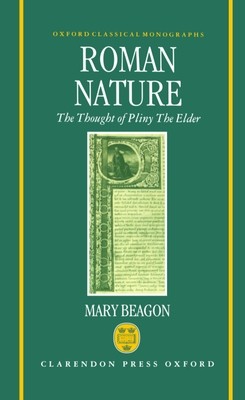
- We will send in 10–14 business days.
- Author: Mary Beagon
- Publisher: Clarendon Press
- ISBN-10: 0198147260
- ISBN-13: 9780198147268
- Format: 14.5 x 22.4 x 2.3 cm, hardcover
- Language: English
- SAVE -10% with code: EXTRA
Reviews
Description
Pliny's Natural History has too often been regarded as simply a quarry for quaint stories--a view which has tended to overshadow its overall structure and purpose. In this book, Beagon redresses the balance and illuminates the Natural History as the work of an author with an identifiable mode of thinking and a coherent attitude toward his clearly-stated theme, Nature. Taking its cue from Pliny, the book examines his cosmology and in particular his portrayal of the relationship between nature and what he considered nature's greatest creation, Humankind. Author and work are also placed in their wider literary and historical context. Pliny himself emerges no longer as a faceless compiler but as a character with a valuable contribution to make to an understanding of intellectual attitudes in the first century A.D. A more typical Roman than most of the intellectual authors studied today, he can offer a much more accurate picture of the Roman in his "natural" setting.
EXTRA 10 % discount with code: EXTRA
The promotion ends in 19d.17:06:31
The discount code is valid when purchasing from 10 €. Discounts do not stack.
- Author: Mary Beagon
- Publisher: Clarendon Press
- ISBN-10: 0198147260
- ISBN-13: 9780198147268
- Format: 14.5 x 22.4 x 2.3 cm, hardcover
- Language: English English
Pliny's Natural History has too often been regarded as simply a quarry for quaint stories--a view which has tended to overshadow its overall structure and purpose. In this book, Beagon redresses the balance and illuminates the Natural History as the work of an author with an identifiable mode of thinking and a coherent attitude toward his clearly-stated theme, Nature. Taking its cue from Pliny, the book examines his cosmology and in particular his portrayal of the relationship between nature and what he considered nature's greatest creation, Humankind. Author and work are also placed in their wider literary and historical context. Pliny himself emerges no longer as a faceless compiler but as a character with a valuable contribution to make to an understanding of intellectual attitudes in the first century A.D. A more typical Roman than most of the intellectual authors studied today, he can offer a much more accurate picture of the Roman in his "natural" setting.


Reviews